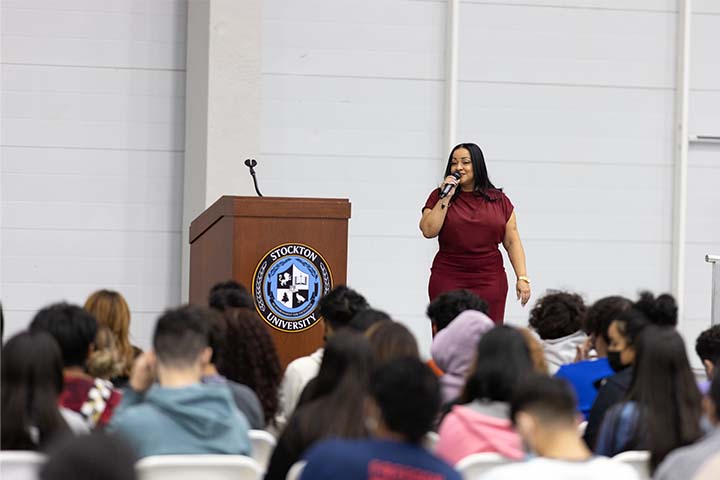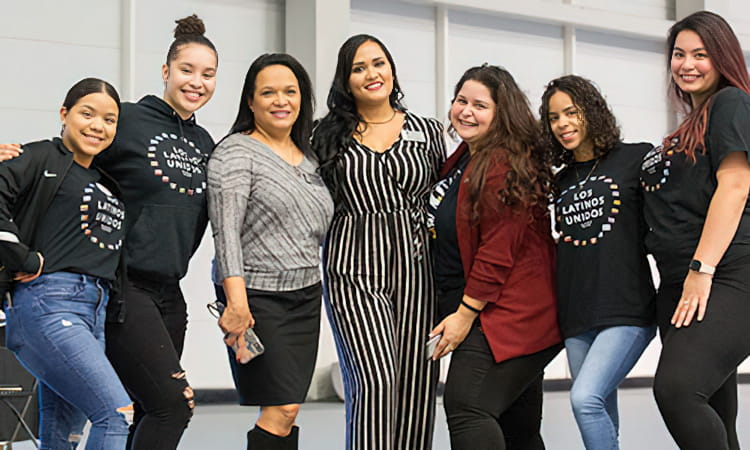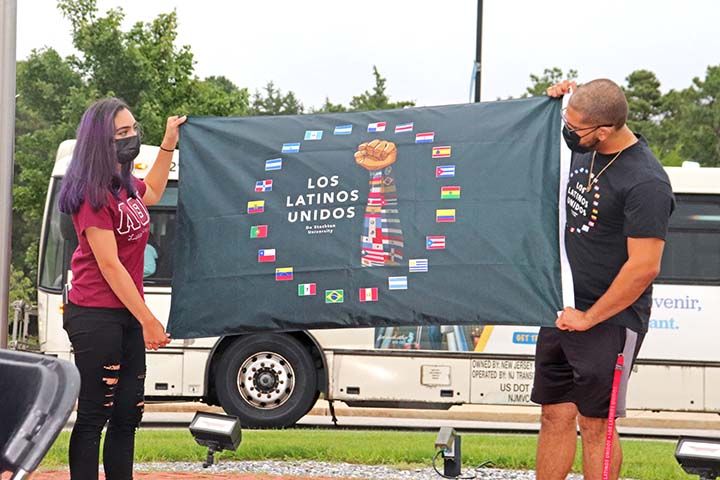Latinx Student Success
Building Connections
By Loukaia Taylor '22
"Students first; vision and strategy follow.”
Guided by this principle, Stockton University strives to create an environment that welcomes all students to not only learn, but to thrive, as university students. Nowhere is this more evident than in its growing community of Hispanic/Latino students, faculty, and staff. Just recently, Stockton was ranked 7th in the nation for Hispanic graduation rates.
According to a report by the Chronicle of Higher Education, “Recruiting and Retaining Students in a Challenging Market,” Stockton’s graduation rate for a cohort of Hispanic students was 71.5% and for all minority students was 73.4%. The graduation rate for all students in that class was 77%. By comparison, the national graduation rate for the cohort of all full-time students who entered a four-year college or university in 2013 was 63%, and the completion rate for Hispanic students was 59%.
How does Stockton achieve that success? It starts before students even apply.
Latinx Visitation Day

Before she was a student at Stockton, Heather Medina, now the University’s first Latina Director of Admissions, was a high school senior looking for opportunities to grow and develop. She was not encouraged by her high school counselor.
“I’m graduating from Camden City, and my guidance counselor told me that I wasn’t ‘college material,’ but I was graduating #20 in my class,” Medina recalled. “The reason the counselor said that was because of my standardized test scores - the SAT. We know, in higher education, that it’s not really indicative at all of how well a student is going to do in college or university.”
Medina was accepted to Stockton, where she was a student senator, a member of Los Latinos Unidos and Lambda Theta Alpha, Inc. and worked in the office of then-Vice President Harvey Kesselman.
Twenty-five years later she is recruiting more students like herself at Latinx Visitation Day.
“The Hispanic population is one of the highest-growing minority groups,” Medina said. “Having that type of program, overseeing special groups coming to campus, and really connecting with schools that have large percentages of under-represented students was really my charge. I’m very passionate about it,” Medina said.
The program started with just Atlantic City and Pleasantville high schools but has grown to include most high schools in South Jersey.
“Stockton student clubs and organizations were instrumental in running the early events and are still involved,” Medina said. “Students really gravitated toward the 'real talk' experience that they had during LVD. It’s so important for students to see somebody who looks like them so that they can think, ‘Wow, she’s been able to achieve this. Maybe the person who told me that I couldn’t do this was wrong.’”
One of Medina’s current goals is to have Stockton officially named a Hispanic-Serving Institution.
“We’ll need at least 20% of the total student population to identify as Hispanic and/or Latino,” Medina said. “Right now, we’re at about 17%. When I first started, we weren’t even at 7%, so knowing that the gap is closing is very pleasing to me.”
Support Services
Jessica Grullon’s title may be Associate Director of Admissions, but her role goes far beyond just helping students get into Stockton. She also understands the importance of helping them adjust and giving them the support they need to succeed.
“It was when I was doing my master’s degree at Drexel in Higher Education and learning about student satisfaction and retention that I started really reading about populations and the various needs of different populations (international, Hispanic, African American, Asian, etc.) and how every population needs different resources in order for them to successfully get their degree. For the Latino population, I wanted to be that Latina voice at tables surrounding discussions about first-generation students,” Grullon said.

First Ospreys, a student organization dedicated to those who are the first in their families to attend college, is just one program that targets under-represented students.
“Through First Ospreys, we were able to create a list of common terms and explanations for first-generation Latino families to keep during the application process,” Grullon said. “For a Latino family that may not have been to a university or college campus in the United States, they may not know what 'bursar' means.”
It's so important for students to see somebody who looks like them so that they can think, 'Wow, she's been able to achieve this. Maybe the person who told me that I couldn't do this was wrong.'"Heather Medina
Grullon is also a founder of TogetHER, which advocates for women of color on campus through meetings, professional development, and mentorship opportunities; and is the staff advisor for Los Latinos Unidos (LLU), the largest Latino club on campus.
“I’m not afraid to sign up for something. Because if I don’t, I fear that there won’t be a Latina voice, and that means that the Latino students won’t have a voice,” Grullon said. “While we are at an amazing time right now, I just want the current Latino community to continue to thrive, and that requires a village. It takes a village for our Latino students to feel seen, heard, and respected, and, as long as I’m here, I’m going to be that village for them.”

Current LLU president Andrew Torres discovered the club his freshman year during the Get Involved Fair. The club’s table was brightly decorated with both Puerto Rican and Brazilian flags flying above it.
“I happened to see both of my flags on the (LLU) logo and was like, ‘Oh, that’s me! Oh, that’s me again right there!’” Torres said. Torres soon became a part of the executive board, and as president of LLU, he coordinated a panel discussion on colorism in the Afro-Latin community and Hispanic Heritage Month.
“The Afro-Latin Colorism panel was the first time in a while that I had seen a room on campus that was entirely full,” Torres said. “Some people had to stand up because there were so many students. It really showed me how important these conversations are and to have a safe space for students to talk freely with other students.”
Torres sees a strong future for the LLU.
“My vision is to just have the Latin community more connected,” Torres said. “We’re doing well, we’re having a lot of events and collabs, but I want to see more of the other students come out and find their place. Seeing students happy is something that I have always loved. During our Brazilian Carnival Workshop, there was a student who came out and she was ecstatic to see everything. She was like, ‘I know this!’ and showed her friends the different treats that we had at the event. It’s just so nice to see someone get so excited about their culture.”
In the Classroom
That personal attention connecting to others extends into the classroom as well.
Arnaldo Cordero-Roman joined Stockton in 1999 primarily to teach Spanish. But thanks to Stockton’s interdisciplinary model, Cordero-Roman’s many interests have found their way to students.
He was inspired by the problems bilingual students deal with, like getting their car serviced and knowing the vocabulary for different car parts. His mother’s illness inspired him to propose a course on Spanish for health care and social service workers.
“My mother was bedridden for several years, and I started asking myself, ‘Why isn’t there a course that addresses Spanish in the health care field or social services?’” Cordero-Roman said. “I was the first to teach that course on the 2000-level and propose it. That then brought along a conversation with the Health Sciences program. We have two professors now, Luis Garcia and Javier Sanchez, that are working on a book with medical terminology in both Spanish and English. That’s a major contribution to the medical community, but other fields like Criminal Justice and Social Work could use that as well.”
Cordero-Roman understands the importance of adapting to help students succeed. He has worked individually with a student who wanted to improve her English proficiency and pronunciation and developed a special Spanish project on baseball for Stockton players who weren’t thrilled to be studying Spanish.
Torres agreed that the personal interest taken by many across campus to help students succeed is key. He remembers Maralyn Mason, former director of the Educational Opportunity Fund program, reaching out to him when he considered skipping the EOF Summer Academy to work.
“(Mason) emailed me and said: ‘The experience and knowledge that you’ll get is going to be a hundred times more than what you would get during a summer job for five weeks.’ I didn’t expect that and was like, ‘She’s being real with me. Okay!’ I made the right choice.”
Senior Elena Gonzalez, a first-generation college student and Literature and Secondary Education major, said it is the combined efforts of everyone on campus that she credits for Stockton’s success.
“I believe Stockton was able to rank 7th in the nation for Hispanic graduation rates because of their ability to craft a culturally safe and responsive environment for the Latino population,” Gonzalez said. “I think back to my freshman year when I attended the Get Involved Fair. I heard a sudden blasting of bachata and stumbled upon the Los Latinos Unidos table. It was there that I got to meet and talk to lots of Hispanic students at Stockton and ask them about how they had liked their schooling so far. I was met by many positive reviews and was excited to continue my college experience at Stockton. The cultural awareness is very strong and seems to be quite essential to the school’s environment.”
Learn more about student support services at Stockton



